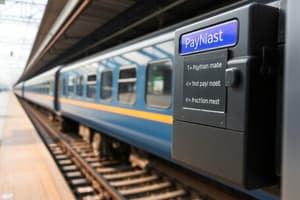Podcast
Questions and Answers
What is the primary purpose of credit transactions?
What is the primary purpose of credit transactions?
- To eliminate the need for physical money transfer.
- To provide a means for individuals to enjoy goods or services without paying for them.
- To ensure that all transactions involve collateral or encumbrance of property.
- To facilitate the exchange of goods, services, or money in the present with a promise of payment in the future. (correct)
What is the primary function of security in credit transactions?
What is the primary function of security in credit transactions?
- To serve as a means of ensuring the fulfillment or enforcement of an obligation. (correct)
- To facilitate the exchange of goods, services, or money without a promise of payment.
- To eliminate the need for collateral or encumbrance of property.
- To provide a guarantee that the transaction will be completed in the present.
Which of the following is an example of a secured transaction?
Which of the following is an example of a secured transaction?
- A credit card purchase with a promise to pay the balance in full each month.
- A loan from a bank with no collateral required.
- A mortgage loan secured by the property being purchased. (correct)
- A personal loan from a friend or family member with no collateral required.
What distinguishes an unsecured transaction from a secured transaction?
What distinguishes an unsecured transaction from a secured transaction?
Which of the following statements about credit transactions is true?
Which of the following statements about credit transactions is true?
What is a key requirement for a valid pledge or mortgage?
What is a key requirement for a valid pledge or mortgage?
What happens when the principal obligation becomes due, according to the text?
What happens when the principal obligation becomes due, according to the text?
What is the significance of the phrase 'free disposal' in the context of a pledge or mortgage, according to the text?
What is the significance of the phrase 'free disposal' in the context of a pledge or mortgage, according to the text?
What is the key legal consequence mentioned in the text if a pledge or mortgage is constituted on the property of a corporation under receivership?
What is the key legal consequence mentioned in the text if a pledge or mortgage is constituted on the property of a corporation under receivership?
What is the primary purpose of a creditor selling the pledged or mortgaged property when the principal obligation becomes due?
What is the primary purpose of a creditor selling the pledged or mortgaged property when the principal obligation becomes due?




